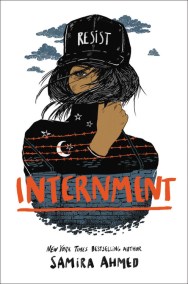Read to Resist with Samira Ahmed, author of Internment
If you haven’t heard yet (you should’ve, though—I never shut up about this book), Internment by Samira Ahmed comes out in exactly a month!
It’s set in a horrifying 15-minutes into the future where Layla and her family is placed in an internment camp for Muslim American citizens. With help from new friends and her boyfriend on the outside, Layla leads a revolution to take down the injustices brought by the camp’s director. It truly challenges readers to fight the complicit silence in society today.
We had the pleasure of hearing Samira introduce her novel in person, but we want the world to hear and see her words, so we filmed it just for you. Bonus: her ARC letter because she is such an inspiring and stunning writer.
Dear Reader,
Internment straddles boundaries. Contemporary and speculative. Past and future. Fear and hope. I write in these spaces because that’s where I live. American. Immigrant. Indian. Muslim. In theory, this country is made of infinite identities—but now, more than ever, I’m a half-outsider.
I wrote the first words of Internment in January 2016. The Republican presidential primary was in its early stages, but the themes of the campaign and of the future presidency were well cemented: Us versus Them, border walls, Mexicans as criminals, black Americans as thugs, queer Americans as deviants, guns over children’s lives, a Muslim ban, a national registry.
America had been down the road of paranoia and ethnic bias before: the internment of Japanese Americans during World War II. But it’s not just our past. As I write this, immigrant children are being ripped from their parents’ arms and indefinitely detained in present-day internment camps. Here we were again, fearmongering based on a group’s identity. Knowing America’s history reminded me that the Constitution wouldn’t necessarily protect us. This terrified me.
Living with that kind of dread can swallow you, so I channeled my fear into a story. So I could find my way out. So I could breathe. When I saw others voicing their rage, rising up, and marching in the streets, it inspired me to use the privileges I do have—educational, financial, professional, and more—to speak the truth. It gave me power. And it gave me hope. So I wrote this story—about struggle, and resistance, and a girl who fights against silent complicity. A girl who persists.
I challenge you to speak up for the wrongs you see in the world.
Sincerely,
Samira Ahmed







